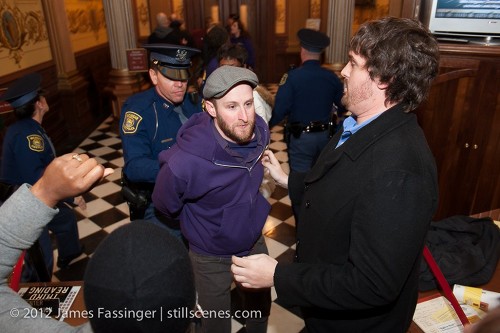
prime lakefront property in Benton Harbor, MI. Photo/Daymonjhartley.com
Unions across the nation were shocked by the passage of the Right to Work law in Michigan. It is the second state (after Indiana) in the Rust Belt, the bastion of unionism, to pass this law. It is a wake-up call for all persons seriously interested in defending the rights of labor to take an objective look at what happened in order to prepare for the future.
No problem just happens. It has a beginning, a process of maturing and finally an environment that allows it to burst forth. In 1664, slaves represented one fourth of the labor force. The first labor law established slavery for life based on color. Ever since, labor in a white skin has been controlled through its separation from labor in a Black skin. In 1677 “free” strikers were imprisoned.
The assault by capital upon labor after the Civil War was accompanied by the widely accepted slogan that “this is a white man’s country.” The result was the inability of Northern unions to organize and defend themselves since they often excluded African Americans or limited them to the production or labor gangs. This included the acceptance of a wage scale in the South that amounted to 50 percent of Northern wages.
Things began to change somewhat with the birth of the Congress of Industrial Organizations and industrial unionism. At that time, around 1936, the capitalists came up with the idea that since they could not legally stop unions, they could legalize non-unionism. The birthplace of Right To Work was the South, where the concept that unions meant communism—and the end of segregation—had deep and historic roots.
Implicit in the acceptance of the organizing drive was the understanding that the Unions would not disturb the South. In return the “Solid South” Senators, who controlled almost all the important committees, allowed some of Roosevelt’s “New Deal” legislation to pass.
There were heroic efforts to organize the South on an integrated basis. The struggles of the Furniture Worker Union, the Sharecropper Union, the Tobacco Workers Union (which gave birth to the Civil Rights anthem “We Shall Overcome”) and especially the Mine Mill and Smelter Workers (which was instrumental in the formation of the National Negro Labor Council), are to name but a few.
The deep, entwined anti communism and racism, coupled with post WWII prosperity, spelt the end to any serious union expansion after the McCarthy period began. The way was now open for the passage of the Taft-Hartley law, which laid the basis for the Right To Work legislation. Fragmented, disarmed and tied to the system they were trying to fight, globalization and robotics were the final nails for union expansion.
The Michigan Right to Work law puts the Union movement at a fork in the road—not a crossroad, but a fork. They cannot for long continue business as usual. It is either continue on the path to a fascist labor front or re-shape the movement on the basis of class interests and class solidarity. It is a big order, since this calls for a conscious moving away from anti-communism. It calls for politicizing the working class on the basis of social consciousness. Here as never before, the future is up to us.

